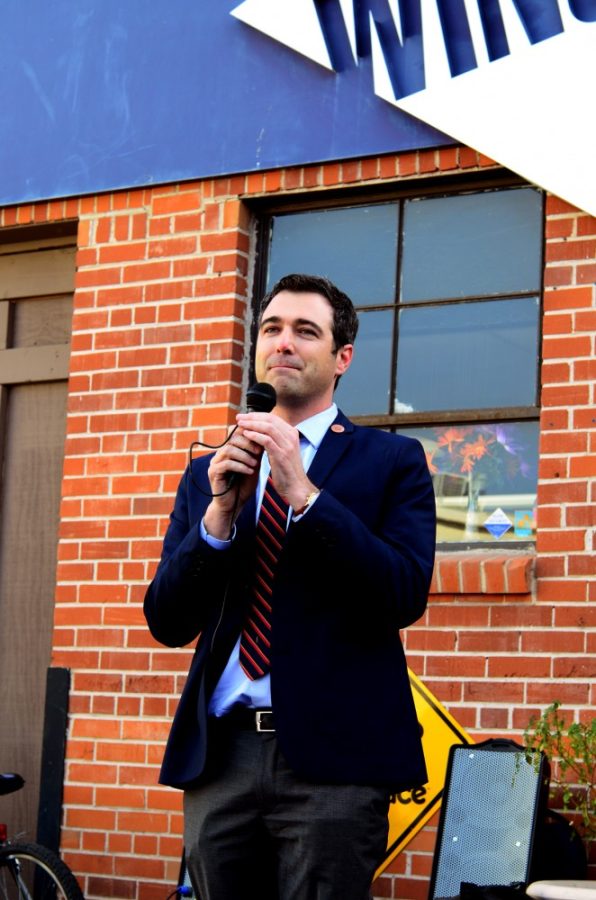Amidst protests and national media coverage, the Arizona House of Representatives passed The Religious Freedom Restoration Act on Thursday.
The Religious Freedom Restoration Act, or Senate Bill 1062 as the Arizona Senate version is known, is presented as an act which will provide extra protection against religious discrimination. The fact sheet given to the Arizona Senate lists how the bill will broaden the definition of the exercise of religion to include the practice and observance of religion by any individual, association, partnership, corporation, church, estate, trust, foundation or other legal entity.
However, C. Michael Woodward, graduate assistant for ally development in the office of LGBTQ Affairs at the UA, said he believes that is just confusing and vague language used to gain support for a bill that will allow discrimination against LGBTQ people by those claiming they are exercising religious freedom.
“We already have religious freedom protections in the Arizona constitution,” Woodward said. “It is absolutely discriminatory, but the reason that it will work for them is because LGBT people are not protected at the federal level.”
When Arizona Rep. John Kavanagh (R-District 8), stood to explain his vote in favor of S.B. 1062 on the House floor on Thursday, he said that this was about providing additional protection to those who want to practice their religion.
“That is what we see here: … misrepresenting a bill as being discriminatory,” Kavanagh said. “I vote yes for a bill that is not discriminatory in the least.”
Kavanagh was not alone in supporting the bill on the grounds that it will provide further protection for religious beliefs and practices.
Rep. Justin Pierce (R-District 25) said that the right to believe in a particular religion is not concrete enough, that without the right to exercise those beliefs, there is no point in protection laws.
“We are protected in acting upon those beliefs,” Pierce said. “If we weren’t protected in acting on our religious beliefs, what protection is necessary? There is no thought police.”
Rep. Demion Clinco (D-District 2), who is the only openly gay member of the Arizona House of Representatives, spoke out at the reading to explain why he opposed the bill. He said that to justify this bill as a religious freedom act is an embarrassment.
“To justify discrimination against the LGBT community and others because of ‘religion’ … it’s an affront to all Arizonans,” he said. “And it’s hurtful, it’s hurtful to me personally, it’s hurtful to the LGBT community — not just here, but throughout the state.”
Rep. Victoria Steele (D-District 9) begged her colleagues to vote no on the bill at the proceedings, saying she believes it could lead to lasting emotional damage for those who identify as LGBTQ.
“I have seen many people struggling to deal with the emotional effects of discrimination, being a member of the LGBTQ community,” Steele said. “I am afraid of what this will do to them, I am very afraid for them. … This bill will hurt people, and I beg you to reconsider your yes votes on this bill.”
Rep. Ethan Orr (R-District 9) said the bill may create unintended consequences that allow people to discriminate based on their beliefs.
“You can’t allow religious freedom for one religion and not allow religious freedom for all religions,” Orr said. “You’re taking people and saying, ‘Because of your practices or because I disagree with your practices, we’re going to exclude you from society.’”
Orr was one of three Republicans to vote against the bill.
“I don’t think that reasonable people who want to work together are going to have a fight as a result of this bill,” Orr said.
Woodward said that he believes the effect of making this law will not only further damage Arizona’s
reputation but could even go so far as to turn students and faculty away from the UA.
“We’re not going to get as many students,” he said. “People already see Arizona as a hostile place because of S.B. 1070. … My friends are already texting me and sending me Facebook messages saying, ‘Why don’t you get the hell out of Arizona?’”
The bill will not be doing anything to improve the community or economy of Arizona, Orr said, and was created by people who are looking for a fight.
“I think often times the laws we create really embolden and empower a political base more than they actually solve the problem,” Orr said.









